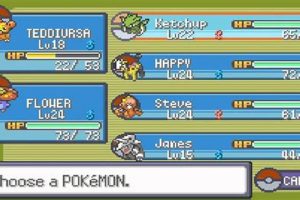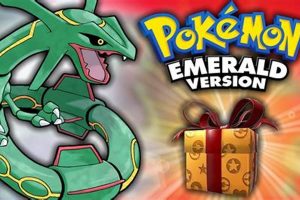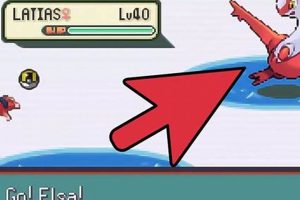The provided term appears to be a nonsensical combination of elements relating to video games. It includes a year (1986), a video game franchise (Pokmon), a specific Pokmon game title (Emerald), an abbreviated pronoun (“u”), and a colloquial term (“trashman”). Analyzing the term requires deconstructing these disparate elements. The year 1986 precedes the Pokmon franchise, suggesting a potential disconnect. Pokmon Emerald was released much later, in 2004 in Japan and 2005 internationally. “U” could represent “you,” potentially referring to the player. “Trashman” is a slang term often used to describe someone considered low-value or unimportant. In this context, it might function as an insult or a self-deprecating identifier within the game’s community.
The significance of such a phrase lies in its potential as a user-generated identifier or in-joke within a specific gaming subculture. It could represent a player’s self-assessment of their skill level or in-game performance, or function as a handle or username that carries a specific meaning for a particular group. Understanding its full context necessitates examining online forums, fan communities, or specific gameplay scenarios where this combination of terms might appear. The historical context is tied to the development and evolution of online gaming communities and the personalized expressions that emerge within them.
Further investigation would involve researching specific online communities, forums, or databases related to Pokmon Emerald or retro gaming in general. Analyzing player-created content, such as forum posts, walkthroughs, or videos, may reveal instances where this phrase is used and shed light on its intended meaning and significance. This exploration could uncover potential connections to specific glitches, gameplay strategies, or even social dynamics within the game’s community.
Gameplay Guidance
This section offers strategic advice applicable to overcoming challenges commonly encountered within the Pokémon Emerald gaming environment. These recommendations aim to enhance player proficiency, optimize resource utilization, and improve overall in-game progress. Adherence to these principles facilitates a more efficient and rewarding gaming experience, especially given the phrase used to reference this article is “1986 pokemon emerald u trashman”.
Tip 1: Efficient Pokémon Training: Focus on battling Pokémon that yield experience points beneficial to the specific stats requiring improvement. For example, battling water-type Pokémon increases speed EVs for the ‘mons that you are training.
Tip 2: Strategic Item Usage: Conserve valuable items such as healing potions and status-curing berries for critical encounters like gym leader battles or elite four challenges. Avoid unnecessary expenditure on easily replaceable resources.
Tip 3: Optimal Team Composition: Construct a balanced team with diverse type coverage to effectively counter a wide range of opponents. This minimizes vulnerabilities to specific elemental attacks and maximizes offensive options.
Tip 4: Explore Thoroughly: Invest time in exploring every accessible area within the game world. Hidden items, secret areas, and rare Pokémon are often located in less obvious locations.
Tip 5: Utilize the Pokédex: Leverage the Pokédex to identify enemy Pokémon types, movesets, and abilities. This information informs strategic decisions during battles and facilitates informed team building.
Tip 6: Manage Money Wisely: Prioritize essential purchases like Pokéballs and key items. Avoid frivolous spending on cosmetic items or unnecessary luxuries until core gameplay needs are met.
Strategic application of these tips optimizes gameplay effectiveness and enhances the overall Pokémon Emerald experience. Proficiency in these areas contributes to a more successful and rewarding playthrough, proving valuable to all players, regardless of perceived skill level implied by the opening of the article.
The subsequent sections will delve into other advanced strategies and techniques for mastering Pokémon Emerald.
1. Temporal Discrepancy
The inclusion of “1986” within the phrase “1986 pokemon emerald u trashman” immediately presents a temporal discrepancy. Pokémon Emerald was released in Japan in 2004 and internationally in 2005, significantly postdating 1986. This temporal anomaly serves as a critical component, likely imbued with specific meaning or intent by the user or group adopting the phrase. This discrepancy is not merely a factual error but rather a deliberate juxtaposition of eras, potentially referencing a nostalgic connection to gaming history, a commentary on the evolution of gaming, or an ironic statement about the user’s own gaming experience. The effect of this is to add an element of deliberate strangeness to the phrase. It is important because it is the first element that would cause someone encountering the phrase to pause and wonder what it means.
One potential explanation for this deliberate anachronism could be a generational reference. A player who began gaming in the 1980s and now plays Pokémon Emerald might use the phrase as a self-aware acknowledgment of their gaming history. It’s a way of saying, “I’ve been gaming since 1986, and now I’m here playing Pokémon.” It could also represent a broader commentary on the gaming industry’s evolution, contrasting the simplicity of 1980s games with the complexity of modern titles. The practical significance of understanding this discrepancy lies in deciphering the intended message or identity the user wishes to convey. Without recognizing the temporal incongruity, the phrase loses a layer of potential meaning and context.
In conclusion, the temporal discrepancy introduced by “1986” in the phrase is not an accidental element. It acts as a deliberate anchor, connecting a specific historical point in gaming with a much later release. This juxtaposition serves as a critical component, imbuing the phrase with potential meanings related to generational connection, gaming evolution commentary, and self-aware irony. Recognizing and understanding this temporal disruption is essential to interpreting the full significance of “1986 pokemon emerald u trashman” and appreciating the nuances of the user’s intended message. While the exact interpretation remains dependent on specific context, the awareness of this discrepancy is a crucial first step in deciphering the phrase’s meaning within the broader context of gaming subcultures and online communities.
2. Gaming Community Slang
The interpretation of “1986 pokemon emerald u trashman” hinges significantly on its potential integration of gaming community slang. Such slang acts as a form of shorthand communication, often evolving within specific game ecosystems and reflecting shared experiences, in-jokes, and subcultural identities. Recognizing and decoding these slang elements is crucial to understanding the phrase’s intended meaning and its resonance within the target community. The interplay between recognizable game elements (Pokemon Emerald), a temporal marker (1986), and colloquial terms (“u,” “trashman”) suggests a deliberate construction intended to convey a nuanced message to those familiar with the relevant slang.
- Evolving Language of Skill Shaming
Gaming communities frequently develop terms to denote varying skill levels, often ranging from respectful acknowledgement to derogatory labels. “Trashman,” in this context, likely represents a self-deprecating or other-directed term indicating perceived lack of skill. The intensity of the term can vary, ranging from lighthearted ribbing among friends to more hostile attacks in competitive environments. Its inclusion within “1986 pokemon emerald u trashman” may signal either a self-assessment of the player’s abilities or a statement about the perceived skill level of the individual to whom the phrase refers. Understanding the specific inflection and usage of such terms within the Pokémon community is vital for accurate interpretation.
- Acronyms and Abbreviations
Online gaming environments foster the rapid development and adoption of acronyms and abbreviations to facilitate quick communication. The “u” within the phrase could represent a shortened form of “you,” potentially directed towards another player or the speaker themselves. Alternatively, it may be an abbreviation for a specific term within Pokémon Emerald, a particular game mechanic, or a popular strategy. Deciphering such abbreviations requires familiarity with the specific terminology employed by the Pokémon Emerald community, as these terms can be highly context-dependent and change over time.
- In-Jokes and Memes
In-jokes and memes form a significant part of gaming community culture, often originating from specific gameplay moments, glitches, or shared experiences. The phrase “1986 pokemon emerald u trashman” could potentially reference a specific event within Pokémon Emerald that is understood only by a subset of players. For instance, it might allude to a particular strategy gone wrong, a humorous bug encountered in the game, or a popular meme circulating within the community. Identifying such references requires extensive knowledge of Pokémon Emerald lore, online forums, and community discussions.
- Nostalgia-Driven Terminology
The “1986” component, juxtaposed with the later Pokémon Emerald, can create a nostalgic context influencing the slang used. Terms might hark back to older gaming eras, creating a blend of modern and retro slang. “Trashman” in this scenario could evoke older gaming terms for poor performance, combined with newer slang, suggesting a complex layered meaning referencing gaming evolution and personal experiences within both eras.
Ultimately, the meaning of “1986 pokemon emerald u trashman” within the framework of gaming community slang depends on the specific context in which it is used. A comprehensive understanding requires familiarity with Pokémon Emerald terminology, online community culture, and the evolving language employed by players. While the literal translation may appear nonsensical, the phrase likely functions as a condensed message intended to convey a specific meaning to those versed in the relevant gaming subculture.
3. Self-Deprecating Humor
The phrase “1986 pokemon emerald u trashman” lends itself readily to interpretation through the lens of self-deprecating humor, a common coping mechanism and form of online identity construction. In this context, “trashman” is likely employed not as a literal assessment of worth, but rather as a playful exaggeration of perceived inadequacy within the gaming context. This self-effacing label, combined with the seemingly incongruous “1986” and “pokemon emerald u” elements, creates a humorous juxtaposition, highlighting the user’s awareness of their potentially limited skill or commitment to the game. The use of self-deprecating humor mitigates potential criticism by preemptively acknowledging perceived flaws, and also fosters a sense of camaraderie with others who share similar experiences or insecurities related to their gaming abilities.
The importance of self-deprecating humor as a component of “1986 pokemon emerald u trashman” lies in its ability to diffuse potential negativity and establish a relatable persona. For example, a player who consistently loses battles in Pokémon Emerald might adopt the “trashman” moniker to acknowledge their struggles and invite empathy rather than ridicule. This approach can be observed across numerous online gaming communities, where players openly embrace labels such as “noob,” “scrub,” or similar terms to express shared frustrations and connect with others. Furthermore, the temporal displacement caused by “1986” adds another layer to the self-deprecating humor. It possibly suggests that even with years of gaming experience (going back to 1986) the player still feels inadequate, increasing the comedic impact. This intentional irony serves to highlight the ongoing challenges of mastering complex games, even for seasoned players. The practical significance of understanding this facet lies in interpreting the user’s intention behind the phrase. If self-deprecating humor is indeed the driving force, the phrase is likely intended as a lighthearted expression of personal experience rather than a serious assessment of skill. This knowledge is important when interacting with or interpreting content created by the user.
In summary, the connection between self-deprecating humor and “1986 pokemon emerald u trashman” reveals a deliberate construction intended to express shared experiences, mitigate criticism, and establish a relatable persona within the gaming community. By adopting the “trashman” label and combining it with incongruous elements, the user creates a humorous juxtaposition that underscores the challenges and frustrations of gaming. Understanding this facet provides valuable insight into the user’s intention and allows for a more nuanced interpretation of their online identity and contributions. Challenges in fully understanding this aspect arise from the subjective nature of humor and the evolving slang used in online communities; ongoing engagement and observation of online interactions are crucial for accurate interpretation. This understanding connects to the broader theme of online identity construction, where individuals use humor and self-awareness to shape their digital personas and interact with others in a meaningful way.
4. Personal Identifier
The phrase “1986 pokemon emerald u trashman,” when considered as a personal identifier, transcends its literal components and becomes a unique digital signature. This serves as a customizable expression, encapsulating aspects of an individual’s gaming experience, identity, and online persona. Its function moves beyond simple labeling, transforming into a self-selected tag that communicates specific attributes to those who understand the underlying references.
- Username/Gamertag
One primary function is its adoption as a username or gamertag across various online platforms. This identifier distinguishes the individual from others within the gaming community, acting as a consistent label within forums, game servers, and social media channels. The phrase’s unusual nature ensures a degree of uniqueness, reducing the likelihood of duplication. The selection of such a distinctive identifier suggests a desire to stand out or convey a particular message through its inherent strangeness and layered references. Real-world examples include obscure references used as usernames on forums or social media, signaling membership within a niche community.
- Online Avatar Representation
Beyond a simple name, the phrase can function as a symbolic representation of the user’s online avatar. The combination of “1986,” “Pokemon Emerald,” “u,” and “trashman” creates a fragmented narrative that might reflect the user’s perceived strengths, weaknesses, or gaming history. It can suggest a self-aware portrayal of a veteran gamer grappling with contemporary titles, or an ironic commentary on their perceived skill level. This symbolic association extends beyond mere identification, shaping the user’s perceived presence and influence within online interactions. For instance, someone using this phrase might deliberately adopt a contrarian or humorous persona in online discussions, aligning their behavior with the identifier’s implied meaning.
- Community Membership Signaling
The phrase may operate as a signal of membership within a specific online community. Shared understanding of the phrase’s meaning, references, and in-jokes would serve as a litmus test for belonging, allowing members to identify each other and establish common ground. This form of coded communication strengthens social bonds and fosters a sense of shared identity. The identifiers distinctiveness ensures only those within the group easily recognize the meaning. This could extend to niche Pokémon Emerald speedrunning groups, retro gaming communities, or groups revolving around ironic gaming aesthetics.
- Personal Branding Statement
For content creators or streamers, the identifier can function as a personal branding statement. It conveys a sense of humor, self-awareness, and familiarity with gaming culture, attracting a specific audience that appreciates the phrase’s inherent irony and layered references. By embracing such an unusual identifier, the creator sets themself apart from the crowd and establishes a unique brand identity. Examples include Twitch streamers adopting obscure or ironic names to attract viewers interested in unconventional content.
In conclusion, interpreting “1986 pokemon emerald u trashman” as a personal identifier reveals its capacity to function beyond mere nomenclature. It serves as a carefully constructed signal, communicating aspects of the user’s identity, gaming history, community affiliations, and online persona. Each element of the phrase contributes to this broader message, transforming a seemingly nonsensical combination of terms into a unique digital signature. Understanding this function sheds light on the user’s intentions and motivations, providing valuable context for interpreting their online interactions and contributions.
5. Meta-commentary
Meta-commentary, in the context of the phrase “1986 pokemon emerald u trashman,” transcends mere surface-level interpretation. It represents a self-aware and often ironic engagement with the elements of gaming culture, historical context, and personal identity that are embedded within the phrase. Understanding the meta-commentary aspect unlocks layers of meaning beyond the literal, revealing a deliberate construction designed to provoke thought and reflection.
- Deconstruction of Gaming Nostalgia
The juxtaposition of “1986” and “Pokemon Emerald” inherently deconstructs gaming nostalgia. “1986” represents an era of relatively simple graphics and gameplay, while “Pokemon Emerald” signifies a more complex and modern gaming experience. Placing these two elements side-by-side creates a meta-commentary on the evolution of gaming, potentially highlighting the differences, similarities, or perceived decline in quality. This deconstruction avoids simple celebration of nostalgia, encouraging critical reflection. This is comparable to films that self-consciously reference older tropes, inviting the audience to consider the evolution of storytelling conventions.
- Critique of Skill-Based Gaming Culture
The inclusion of “trashman” carries a potential critique of the often-toxic skill-based gaming culture. By self-identifying as “trashman,” the user might be commenting on the pressure to perform well, the prevalence of elitism, and the often-harsh judgment directed towards less-skilled players. This can be seen as a subtle pushback against the pressure to conform to arbitrary standards of gaming excellence. Its akin to satirical articles that poke fun at the over-the-top competitiveness in esports.
- Parody of Online Identity Creation
The phrase, as a whole, functions as a parody of online identity creation. By stringing together seemingly random and incongruous elements, the user might be commenting on the artificiality and performativity of online personas. It serves as an exaggeration of the common practice of selecting usernames, avatars, and bios to construct a desired image. This echoes real-world instances of absurd or nonsensical social media profiles that deliberately defy conventional expectations.
- Self-Awareness of Gaming Tropes
The combined elements might reflect an acute self-awareness of common gaming tropes. Recognizing that Pokemon Emerald has a limited lifespan, the phrase may be a deliberate parody. Similarly, “U” acts a play on the gamer’s own participation. The awareness creates an ironic tone. This can be compared to TV shows that break the fourth wall, acknowledging their fictional nature and engaging the audience in a self-referential manner.
By analyzing the elements of “1986 pokemon emerald u trashman” through the lens of meta-commentary, its role as a unique expression emerges, offering perspectives on nostalgia, skill-based gaming, online identities, and game conventions. While individual interpretations may vary, its deliberate composition invites reflection and reveals insightful commentary on the multifaceted world of gaming and its surrounding culture.
Frequently Asked Questions Regarding “1986 pokemon emerald u trashman”
This section addresses common inquiries and provides clarification regarding the significance and interpretation of the phrase “1986 pokemon emerald u trashman.” It aims to offer objective insights based on analysis of its constituent elements and potential contexts.
Question 1: Is “1986 pokemon emerald u trashman” a reference to a specific event in gaming history?
No definitive event directly corresponds to the entire phrase. The year 1986 predates the Pokémon franchise, and Pokémon Emerald was released much later. Therefore, the phrase does not commemorate a single historical occurrence. Instead, it likely functions as a constructed identifier drawing from disparate elements.
Question 2: Does “trashman” denote literal trash or a gaming-related meaning?
Within the context of online gaming, “trashman” likely carries a colloquial meaning, potentially indicating perceived low skill, inadequate performance, or a self-deprecating acknowledgment of limitations. It does not refer to literal waste disposal.
Question 3: What is the significance of the pronoun “u” within the phrase?
The “u” likely functions as an abbreviation for “you,” potentially directed towards oneself or another player. Its precise meaning is context-dependent, requiring further information regarding the user and their specific interactions.
Question 4: Is the phrase intended to be offensive or derogatory?
The intent behind the phrase cannot be definitively ascertained without additional context. It is possible that the phrase is employed humorously, ironically, or self-deprecatingly, rather than with malicious intent. The user’s history and online interactions should be considered.
Question 5: How can the complete meaning of the phrase be deciphered accurately?
Deciphering the phrase accurately necessitates examining the context in which it is used. Analysis of the user’s online profile, forum posts, gaming history, and community affiliations may reveal clues regarding its intended meaning and significance. Gathering additional information is often crucial.
Question 6: Does “1986 pokemon emerald u trashman” have any official affiliation with Nintendo or The Pokémon Company?
The phrase has no official affiliation with Nintendo or The Pokémon Company. It is likely a user-generated construct lacking any endorsement or recognition from official entities.
In summary, “1986 pokemon emerald u trashman” represents a complex and multi-layered phrase whose meaning is context-dependent and open to interpretation. Its constituent elements draw from gaming culture, historical references, and online slang. Deciphering its significance requires careful analysis and awareness of the user’s intentions and online interactions.
The next section will explore advanced strategies for mastering Pokémon Emerald gameplay, moving beyond the initial interpretation of the phrase.
Conclusion
This article has methodically deconstructed “1986 pokemon emerald u trashman,” dissecting its individual components and examining their potential interrelationships. The analysis extended beyond literal interpretations, exploring the phrase’s possible functions as gaming community slang, a vehicle for self-deprecating humor, a unique personal identifier, and a form of meta-commentary on gaming culture. The temporal anomaly introduced by “1986,” the colloquial meaning of “trashman,” and the ambiguity of “u” were all scrutinized, highlighting the complexities inherent in deciphering user-generated expressions within online communities. The phrase does not commemorate a specific event, but instead blends an assortment of eras and cultural components to form a complex phrase.
Ultimately, the meaning of “1986 pokemon emerald u trashman” remains contingent upon its specific context. While a definitive, universally applicable translation remains elusive, the exploration provided here offers a framework for approaching similar phrases encountered within digital landscapes. Continued engagement with online communities and a nuanced understanding of gaming subcultures are crucial for accurately interpreting the evolving language and expressions that shape online interactions. Further research could explore similar phrase patterns and gaming’s cultural phenomena.







